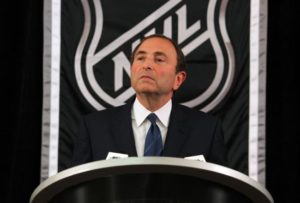The NHL has now stammered into a seventh week of its players being locked out. The obvious damage thus far is the loss of the possibility of a full season and threats to cancel the annual Winter Classic. The games not being played are hurting more than just the schedule though. The game of posturing and negotiating is one that nobody wins.
For the owners of the individual teams, those whom are best set to endure the absence of hockey financially, no games still means lost revenue. While they are technically the party responsible for the lockout, the National Hockey League Players’ Associaton (NHLPA) is just as much to blame.
According to several media outlets negotiations have broken down completely between the two sides after the league sent a proposal that was countered by three proposals by the NHLPA. Since then the two sides have been engaged in a stare-down. The owners refuse to meet unless the players agree to the principles of their proposal and the players refuse to meet unless that condition is thrown out. If there is any talk going on right now it is negotiating a way to negotiate.

Many players have said they set aside extra savings in anticipation of this work stoppage. Many of the owners are doing alright financially as far as their personal finances go. Those whom are being hurt by the lockout most are the many entities and individuals whom do not have a seat at the negotiating table.
A recent AP article highlights the plight of businesses whose revenue is tied to the NHL. In cities where there are no NFL or NBA teams to make up the lost business like San Jose, California or Raleigh, North Carolina the impact is greatest. The article quotes Sean O’Byrne, the owner of St. Paul, Minnesota’s Great Waters Brewing Co., located near the Xcel Center where the Minnesota Wild would be playing their home games. O’Byrne says his business is down 20 percent compared to where he was at this point last year.
When there are no hockey games no one buys food at the arenas or local restaurants. No one utilizes the public transportation or taxis to get to and from the hotel rooms they aren’t staying in. Parking lots built to accommodate hockey traffic from locals sit empty. Stores that have bought officially licensed merchandise hoping to re-sell it at a profit to fans are sitting on inventory that isn’t moving. No revenue means businesses can’t afford to keep people employed much less take on new hires. The issues that divide the owners and players have a negative impact beyond themselves.
Those issues are mostly financial. The first big issue is how to split up the revenue the league makes. The latest proposal from the owners was a 50/50 split. That was countered by the players with a sliding share that reduces their share from 54% to 52% over the term of the deal. The players argue they deserve a bigger cut of the money because their bodies are out on the line every game. The owners argue that it takes money to run a NHL team and a profitable franchise is necessary to keep them employed. Another issue looms still larger.

The part of the contract the owners insist on the players accepting is the insertion of a clause which allows owners to defer payments on player contracts. That would in essence allow them to “back load” contracts. They could sign a player to a long-term deal worth millions of dollars and only pay the players a small portion of it over the first few years.
That would leave the bulk of the money due in the contract after it had expired at which point the player could be released and the team save some money that way or the team could re-negotiate another back-loaded contract. It’s understandable why the players are resistant to allowing that language in a new collective bargaining agreement.
The owners argue it is a way for them to protect against age and attrition in a player. The value of a player to a hockey team is nearly always less at the end of the contract as it is when he signs it. By deferring the money in a contract the owners are afforded a type of “insurance” against injury and poor performance. It protects their interests by providing a natural performance incentive for players. It’s also understandable why the owners want this language in a new collective bargaining agreement.
The positions of both sides on the issue are understandable. Not understandable, however, is both sides waiting until the old CBA expired to even begin negotiations on a new CBA. The exact date of the expiration of the old CBA was known for years. It wasn’t a surprise. While it’s hard to predict the future years in advance and gauge what the revenue figures will be, the essential issues of the deal, such as contract deferments, could have been negotiated months ago with only the numbers left to be discussed.
While the two sides continue to simply sit and wait for the other side to blink, the servers of Great Water Brewing Co. and hundreds of others like them would love to remind them that this is a game nobody wins.




